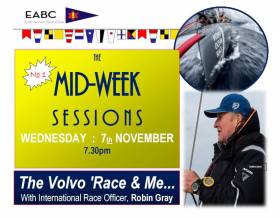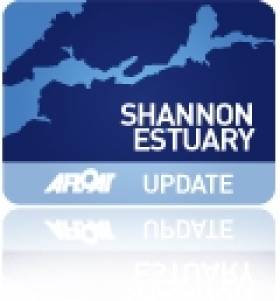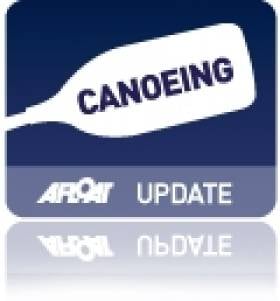Displaying items by tag: talks
East Antrim Boat Club Launches ‘Mid-Week Sessions’ Talks Series
East Antrim Boat Club in Larne is ready to launch its new series of events ashore next month.
Taking place each Wednesday in November, the Mid-Week Sessions will feature a mix of topics, speakers, performers and presenters, all of whom will be linked together under a nautical banner.
Each event at the Curran Point club starts at 7:30pm, with the first on Wednesday 7 November hosting Robin Gray, international race officer and RYA race management co-ordinator for Northern Ireland.
Robin will talk his experiences on the management team of the Volvo Ocean Race, lifting the curtain to give a glimpse of all that occurred — good and bad — behind the scenes.
Future guests include writer, storyteller and coach Jane Talbot (14 November); shipwreck scholar Dr David Hume (21 November); and TV producer Brian Black, who will discuss his experiences filming in the Arctic (28 November).
Whether you’re a competitive sailor, cruiser, potterer or simply passionate about the maritime world, you are sure to find something of interest.
Illustrated Talks On Shannon's Natural Heritage Throughout February
#Shannon - MulkearLIFE and Inland Fisheries Ireland have announced details of a series of free illustrated talks taking place in Limerick throughout February on the extraordinarily rich natural heritage of Ireland, and in particular the Lower Shannon.
The talks form part of MulkearLIFE’s Environmental Education Programme, an outreach programme in local schools and the local community in the Mulkear catchment. The series will be hosted over four Tuesday evenings and will include leading experts sharing their knowledge on farming and conservation and biodiversity management.
Among the talks will be the fascinating story of Atlantic salmon in the River Shannon, presented by Dr Phil McGinnity on 12 February. Dr McGinnity is Beaufort Principal Investigator with UCC’s Aquaculture & Fisheries Development Centre, with more than 23 ears of experience in fisheries science and management, and his talk will outline new and extremely exciting research on the genetic make-up of various salmon types found in the Shannon. He will also examine the history of salmon fisheries on the Shannon. His talk should be of particular interest to anglers far and wide and anyone with a general interest in Irish biodiversity.
On 19 February, Colette O’Flynn will relate the scary story of what is emerging in terms invasive non-native animals and plants arriving into Ireland's coastal and inland waterways. O’Flynn is a research officer with the National Biodiversity Data Centre in Waterford. She manages the National Invasive Species Database for Ireland, which tracks non-native invasive animals and plants in Ireland. She is involved with many European and international invasive species information networks and has been involved with invasive species policy development for the European Commission. She previously worked in various areas in biodiversity education and awareness. Her talk should be of interest to a wide variety of people, especially anglers and those with an interest in Irish wildlife and general biodiversity.
The series of illustrated talks will conclude on 26 February with a talk by Eamon Cusack on building partnerships for sustainable fisheries on the Lower Shannon. Cusack is extremely well known in the fisheries world with over 35 years experience in inland fisheries management. As the former CEO of the Shannon Regional Fisheries Board, he encountered many of the challenges facing fisheries management, and has hands-on experience of policy development, strategic management, change management, enforcement, development and rehabilitation. This talk will focus on his recent work to bring together anglers and the ESB to provide to build effective and durable partnerships for sustainable fisheries. His talk should be of particular interest to local anglers and anyone with a general interest in conservation management and planning.
But the series begins on 5 February with a talk presented by Ruairí Ó Conchúir on conservation farming and biodiversity in the Upper Mulkear Catchment. Ó Conchúir is the manager of MulkearLIFE and has worked in land care management, rural development, farming for conservation and fisheries restoration work for over 20 years, including 10 years in Southern Africa. His talk will focus on the work of MulkearLIFE with farmers over the past three years, with a particular emphasis on partnership work with farmers to improve local habitats. The talk will also attempt to map out where upland farming in Ireland is heading and review work in other uplands parts of Ireland, and outline the likely implications are for upland communities, related farming and habitats post 2014. His talk should be of particular interest to anyone with a general interest in farming, the Irish uplands and the future of EU agri-environmental supports post 2014.
The venue for all talks is the Inland Fisheries Ireland office at Ashbourne Business Park, Dock Road, Limerick. There is plenty of free parking at the front of the building at night. Talks will commence at 8pm sharp and there is free admission to all talks. Further information regarding any of the talks may be obtained from the project [email protected] or from MulkearLIFE, Inland Fisheries Ireland (Limerick) at 061 300 238 or 087 062 5582.
Sea Kayaking Symposium in Mayo this October
The Irish Sea Kayaking Association (ISKA) will host its annual symposium on 8-9 October 2011 in Mulranny, Co Mayo.
The activity-filled weekend at the Mulranny Park Hotel will include training workshops, peer paddles and talks by leading kayaking experts.
Delivering the keynote speech will be Jasper Winn, author of Paddle: A Long Way Around Ireland, who will use a mix of digital slides, video clips and live music to illustrate his account of his trip around the country by kayak.
For more details visit the ISKA website at irishseakayakingassociation.org.


























































